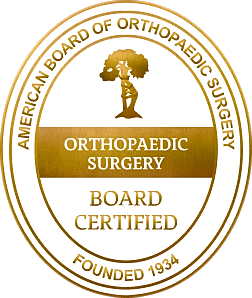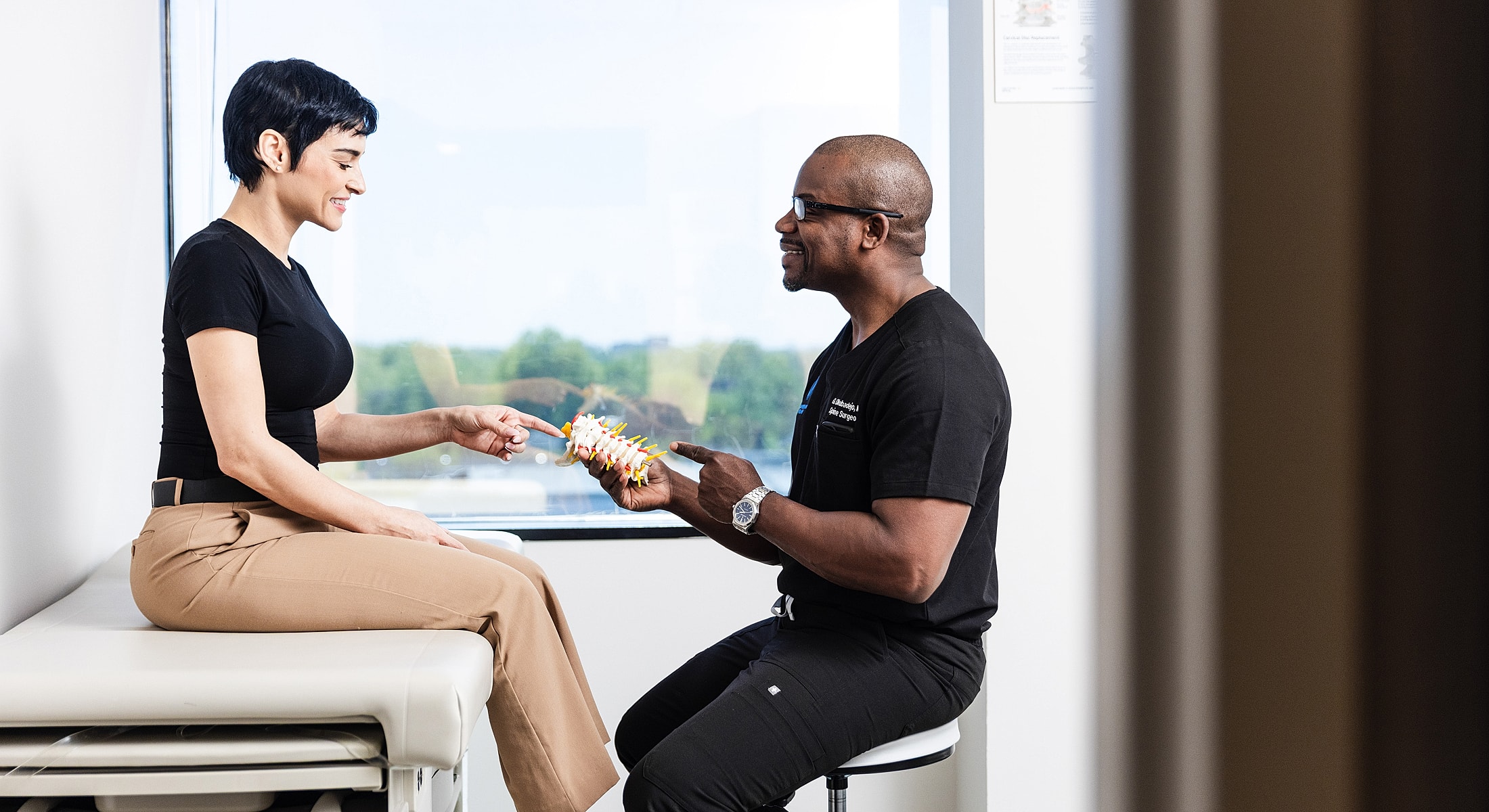
in New York & New Jersey

















Living with chronic neck or back pain can be exhausting, especially when it's caused by the gradual wear and tear of the spine.
Spondylosis is a degenerative condition that affects millions of adults, often leading to stiffness, limited mobility, and discomfort that interferes with daily life. While it’s a natural part of aging for many, it doesn't mean you have to live in pain. At the Institute for Comprehensive Spine Care, we understand the impact that spondylosis can have on your life. Led by renowned spine specialist, Gbolahan Okubadejo, MD, FAAOS, our dedicated team is committed to providing exceptional care and personalized spondylosis treatment options to help you regain your quality of life.
Spondylosis is a prevalent degenerative condition that affects the spine, primarily involving the gradual deterioration of the vertebral discs and facet joints.
Over time, the normal wear and tear on these structures can lead to various symptoms, including pain, stiffness, and a decrease in mobility. The changes associated with spondylosis, such as disc degeneration, bone spurs, and inflammation, can contribute to discomfort and limit your daily activities. We specialize in the diagnosis and treatment of spondylosis, utilizing our expertise to provide comprehensive care tailored to meet your specific needs.

During your initial appointment for spondylosis treatment NYC & NJ spine surgeon, Dr. Okubadejo, will begin by reviewing your symptoms, medical history, and lifestyle to understand how spinal stiffness or discomfort may be affecting your daily activities.
A physical exam allows us to assess your posture, flexibility, and nerve function, helping to identify signs of degenerative changes in the spine. To confirm the diagnosis and determine the extent of degeneration, we use advanced imaging tools such as X-rays, MRI scans, and CT scans. X-rays are useful for detecting bone spurs, disc space narrowing, and vertebral alignment. MRI scans provide a more detailed look at soft tissues, including spinal discs and nerves, while CT scans offer high-resolution images that help evaluate more complex cases. This multi-layered approach ensures we accurately diagnose spondylosis and develop a treatment plan that’s personalized to your specific needs.

Treatment for spondylosis focuses on relieving pain, improving mobility, and preventing further degeneration of the spine.
Most patients respond well to non-surgical therapies such as physical therapy, anti-inflammatory medications, activity modification, and guided exercises that strengthen the supporting muscles around the spine. These approaches are often enough to reduce discomfort and help you return to your normal activities with greater ease. For more advanced cases - especially when symptoms involve nerve compression, radiating pain, or loss of function - surgical intervention may be considered. Procedures like spinal decompression, discectomy, or spinal fusion are tailored to the specific area and severity of degeneration. At The Institute for Comprehensive Spine Care, Dr. Okubadejo carefully evaluates your condition and works closely with you to develop a treatment plan that matches your health goals, lifestyle, and long-term needs.

At the Institute for Comprehensive Spine Care, we recognize that successful treatment for spondylosis goes beyond the procedure itself.
Our comprehensive approach encompasses personalized rehabilitation programs and post-treatment care to enhance your recovery. We utilize a range of pain management techniques and work closely with skilled physical therapists to design a customized rehabilitation plan that supports healing, restores functionality, and minimizes downtime. Rest assured, we will be with you every step of the way, guiding you through your recovery journey to achieve the best possible outcomes.
Spondylosis treatment can significantly improve comfort, mobility, and overall quality of life.
Many patients experience less pain, greater flexibility, and better function with a personalized care plan that may include physical therapy, medication, or surgical intervention. Surgical patients often find relief from nerve-related symptoms and improved spinal stability. With the right treatment and supportive lifestyle changes, long-term outcomes are strong. At The Institute for Comprehensive Spine Care, Dr. Okubadejo focuses on lasting results - not just symptom relief - so you can stay active and comfortable for the long run.
With multiple locations in NY and NJ, our team at the Institute for Comprehensive Spine Care is committed to providing comprehensive solutions for individuals suffering from spondylosis. Our experts are dedicated to evaluating each patient’s unique situation and tailoring the most effective treatment approach, whether it involves non-surgical interventions, minimally invasive procedures, or spinal surgeries.
We understand the importance of accurate diagnosis. That’s why we employ state-of-the-art diagnostic technologies to precisely identify the nature and extent of spondylosis. By combining these advanced tools with our extensive expertise, we can develop a personalized care plan that aligns with your specific needs and goals.
Don’t let spondylosis limit your daily activities or cause you unnecessary pain any longer. Take the first step towards relief by scheduling a consultation with us today. Trust in our expertise and compassionate approach as we strive to alleviate your symptoms and restore your well-being to its fullest potential.
Dr. Okubadejo’s patients consistently cite professionalism, results, and bedside manner as top reasons for their satisfaction.
★★★★★
Spondylosis is primarily caused by the natural aging process and degeneration of the spine over time. Factors such as genetics, previous injuries, and lifestyle choices may contribute to its development.
Common symptoms of spondylosis include neck or back pain, stiffness, reduced range of motion, and radiating pain or numbness in the extremities. The specific symptoms experienced may vary depending on the location and severity of the degenerative changes.
While spondylosis cannot be completely cured, appropriate treatment and management strategies can help alleviate symptoms, slow down its progression, and improve your quality of life. The goal of treatment is to manage pain, improve functionality, and maintain an active lifestyle.
While it may not be possible to prevent spondylosis entirely, certain measures can help reduce the risk or delay its onset. These may include maintaining a healthy weight, practicing good posture, engaging in regular exercise, and avoiding activities that strain the spine.
Yes, in many cases, spondylosis can be effectively managed without surgery. Non-surgical treatment options, such as physical therapy, pain management techniques, lifestyle modifications, and the use of assistive devices, can often provide relief from symptoms and improve spinal function. These conservative approaches are usually the first line of treatment, and surgery is considered only when non-surgical methods are unsuccessful or in severe cases.
While treatment for spondylosis can help manage symptoms and slow down its progression, there is a possibility of recurrence, especially if underlying factors are not adequately addressed or if there are ongoing factors contributing to degeneration. Regular follow-ups are important to monitor your condition and manage any potential recurrences.


